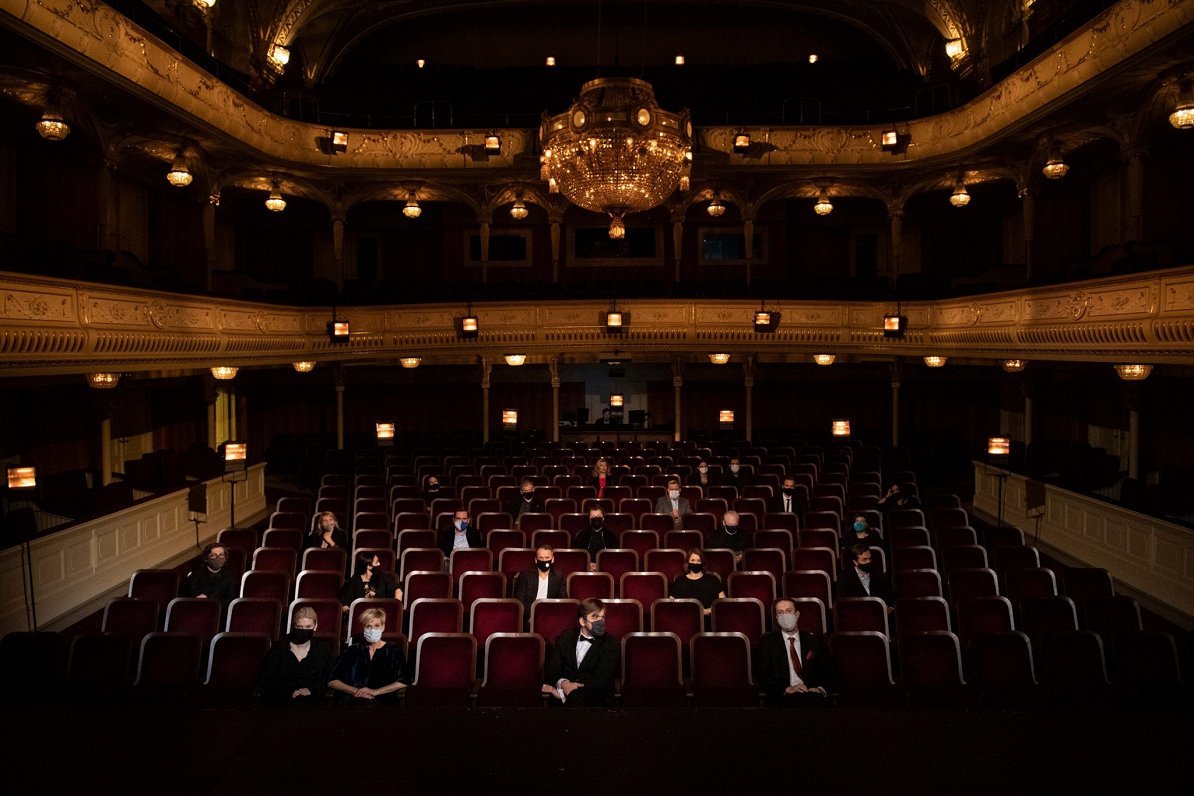Distant but sincere
Theater researcher and last season’s “Players’ Night” jury representative Līga Ulberte, cultural journalist Atis Rozentāls and theater scientist, Zane Radzobe, a representative of the jury of the next season’s “Players’ Night”, expressed satisfaction with the ceremony on the Latvian Radio program “Kultūras Rondo”.
“Extremely positive impressions of the ceremony. It seems to me that everything went well in these terribly difficult conditions, when they didn’t know until the last how they could or could do what. In general, I feel that the Liepaja team is a huge Malachi. evaluated by Līga Ulberte.
She made no secret of waiting for the “Players’ Night” ceremony with concern.
“At yesterday’s ceremony, I liked two things that are especially symbolic of this time. I really liked Krista Burāne’s cat, which we saw in her live format playing in bed, as happened in many Zoom.” at rallies. Of course, also the stage of the New Riga Theater, which symbolically shows not only the regularities of Māra Ķimele ‘s creative life, but also the fact that we are currently in such a stage of reconstruction in the theater, “admitted Zane Radzobe.
“My impressions are also very positive,” said Atis Rozentāls. “I want to point out that theaters organized and maintained this atmosphere on the spot. One concern was that this sense of community would dissolve, but it was amazingly created in each of these micro-groups. that the people were together in their environment and supported each other. They also stood up in an organized way to honor the winners of the Lifetime Achievements. It was nice to see it happen in extremely difficult conditions. The Minister of Culture Facebook has called it an impossible mission, but mission succeeded. “
Rosenthal also noted that the team of its creators and the conclusions from the experienced “Kristaps the Great” presentation ceremonies.
Consensus and compromise
Despite the idea that there was unanimity in the jury’s assessments, Līga Ulberte explained that the jury’s opinions also differed.
“I have always said, I also have experience in various juries in the context of theater, that the decision of the jury is not a manifesto, it is to a large extent a compromise.
Of course, as in any nomination, I can absolutely admit and not hide that Valters Sīlis as the director of the year – there was no discussion at all, it was an absolute consensus.
But at the same time, there were nominations, including the big, responsible nominations, where the discussions were long, long, but I think that is a good thing, because it means that there is a lot of competition, and it shows that the process is creative and active. But it cannot be said that all these decisions are unanimous and unanimous. “
Atis Rozentāls highlighted Walter Sīlis’ performance “The Boy Who Saw in the Dark”, which received the prize as the annual small form show and the “Grand Prix”, Krista Burāne’s show “The Immoral” ”, Which was recognized as the annual big show. “Of course, every critic who has been on the jury at least once, and I have had such joy for four seasons, compares and thinks, ‘How would I vote and not vote?’, But I think the result is very balanced and logical. those individual achievements as well as the performances that are highlighted. ”
Zane Radzobe, on the other hand, praised the work of the jury at such a difficult time. “I have to say that I really admire how thorough the work has been, given what last season was like, and given the emotional background that has, of course, moved on to this season as well. Of course, the situation in which “The previous jury was supposed to work and where we have to work is far from the norm. Of course, as always, there are different tastes in different contexts, but I also want to congratulate all the winners.”
Līga Ulberte admitted that she would describe the work on evaluating the performances of the past season as an experience, which also suggests changes in the field of theater criticism.
“I would not call it success, I would call it experience. Success is not for anyone. It’s just a desperate time for theaters, and I can agree with that yesterday’s “Today’s issue”, where Dana Bjorka and Juris Žagars were invited. They both admitted that there was no real sense of celebration. It is objective. Success is not – experience, training in the sense that, of course, critics also have to change and think about what to do with these interesting intermediate forms, digital forms, outdoor forms, festival performances, it is very interesting professionally, but I would not want more, “admitted Ulberte.
Theater season in three acts
Līga Ulberte said that despite the pandemic conditions, the world of theater also has a spark of vitality. Describing the past season, which had to be evaluated, the theater scientist divided it into three stages. “The first part is until March 13, which is a classic season that ended unexpectedly. Because it was so unexpected and unplanned and unforeseen for anyone, it is very difficult to make generalizations, because it is not possible to understand what was planned, what was planned for the end of each theater season. “
According to Ulbert, the second stage was a period of disruption, characterized by attempts to revive theatrical processes that have stopped with adaptations of performances to the digital environment.
Līga Ulberte went on to say that the third stage was the brightest and most significant: “The third stage was what really started at the end of June, in August. Theaters returned to life, began playing outdoors, and continued online.
It seems to me that at that very moment, in the third phase, it was noticeable that the actors are very tough and have extremely good creative energy, more intense, more concentrated, more precise, more powerful than in a routine show in everyday practice. ”
Atis Rozentāls expressed his pleasure that due to these unusual circumstances, the Valmiera Summer Theater Festival has also come to the attention of the jury.
“I have a private pleasure, and I very much hope that the Theater Workers’ Union will take into account the fact that the Valmiera Summer Theater Festival has finally been fully integrated into the theater process due to the pandemic. One show from this festival has won the award as the best show for children, was nominated for other shows and artists. This is a thing that had fallen out so far, because the jury ended its work in June and the next jury started its work in September, but the festival is in August. Now it has been forced that the festival is being integrated into the program. ”
Rozentāls emphasized that the nominations for the Valmiera Theater Summer Festival performances “Players’ Night” are proof that this is an art and theater event that should be taken into account in the future in the context of Latvian theater.
Theater without basic function
Describing this season, which the “Players’ Night” jury will have to evaluate, Zane Radzobe emphasized that it is related to change and nervousness. “Speaking of this season, I have to say that everyone is very nervous, including the jury and the critics. If in the context of last season the crisis came unexpectedly, so there were different solutions to the crisis, then I think this season is different from As Līga has already said, of course, theaters are understandably desperate, because it is a very complex system, not for nothing do we usually talk about financial matters, but in this context we have to talk about Another thing that seems very important to us is that this year we are forced to admit that theaters will have to change for a variety of reasons. ”
Zane Radzobe also expressed concern that the changes caused by the crisis would leave lasting impressions on the theater industry.
“Even when this crisis is over, probably a lot has changed in the theater system. The fact that the theater will be a much more exclusive thing is a more difficult thing to access due to financial reasons, ”explained Radzobe.
“It is possible that positive things will come from it, as Līga said, for example, these digital forms, which would be used in essence.
Last year, we saw them more as solutions to the crisis, not very well thought out, then at this point we should start thinking that people consciously understand that it is part of the future and that it consciously shapes it. “
At the same time, Atis Rozentāls emphasized that the positive aspect of this period was that theater rehearsals could have taken place and performances would be ready in the theaters’ repertoires.
“In any case, when it comes to the situation of the theater, which was also yesterday in this League-mentioned interview with Yuri Žagars and Dan Bjork, the difference from its first break is that theaters now continue to produce performances that cannot be shown. stage, shown as premieres in their own circle, without the public, but already taking into account that there are already funds for which to perform these performances. “
Līga Ulberte admitted that in her opinion, the crisis of theater and spectator relations will last even after the pandemic.
“I do not know, I am not an optimist. I don’t think theater as an art form will end with this crisis, certainly not,
but to be honest, such a situation is an unprecedented situation, when the theater is deprived of its basic function – the function of live communication with the person, with the spectator. Even during the war he played theater and does not play now.
I do not think that the art form will end, but it seems to me that the crisis, that is, the crisis of spectator-theater relations, may continue after the pandemic. I really hope I’m wrong, but I’m afraid the time it will take for the audience to return to the theater may take longer for a variety of reasons, ”said Ulberte. “That’s why I think these digital [risinājumi], maybe we can call them surrogates or auxiliary forms, but they are needed to remind you that there – on the other side of that screen – there is a live actor and that live contact is more important than screen contact. That’s why I think it’s very good that yesterday’s “Players’ Night” took place, despite all the weddings and all the “buts”, because it also reminds us of how much we all really want theater. “
–


